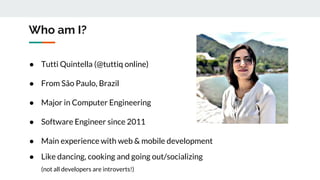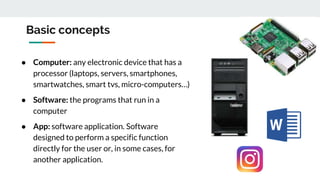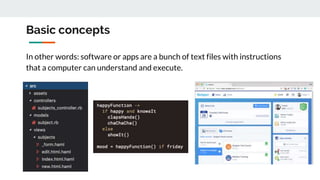Introduction to the Software Development world
- 1. Introduction to the Software Development world If you want to become a software developer, press enter to start.
- 2. ŌŚÅ Tutti Quintella (@tuttiq online) ŌŚÅ From S├Żo Paulo, Brazil ŌŚÅ Major in Computer Engineering ŌŚÅ Software Engineer since 2011 ŌŚÅ Main experience with web & mobile development ŌŚÅ Like dancing, cooking and going out/socializing (not all developers are introverts!) Who am I?
- 3. ŌŚÅ What's a software or app? Can I run software anywhere? ŌŚÅ What are operating systems or platforms? ŌŚÅ What can I do with software development? What kind of developer do I want to be? ŌŚÅ What are programming languages vs frameworks? ŌŚÅ What to consider when choosing a programming language or framework? First things first
- 5. Basic concepts ŌŚÅ Computer: any electronic device that has a processor (laptops, servers, smartphones, smartwatches, smart tvs, micro-computersŌĆ”) ŌŚÅ Software: the programs that run in a computer ŌŚÅ App: software application. Software designed to perform a specific function directly for the user or, in some cases, for another application.
- 6. Basic concepts In other words: software or apps are a bunch of text files with instructions that a computer can understand and execute.
- 7. Basic concepts ŌŚÅ Operating system: the base software that supports a computer's basic functions, like managing hardware resources and software applications. Ex: managing information on the memory, managing peripherals, installing and running apps. ŌŚÅ Platform: a major piece of software. Ex: operating systems.
- 8. What can I do with software development? What kind of developer do I want to be?
- 9. App / Game Development ŌŚÅ Web Apps / Games (web pages, software you access from a browser) ŌŚŗ Divided in Back-end (Server side) and Front-end (Client side) ŌŚŗ Examples: Amazon, Gmail, Google Docs, web games ŌŚÅ Mobile Apps / Games (software you run on a phone or tablet) ŌŚŗ Android, iOS ŌŚŗ Examples: Uber, Whatsapp, Instagram, mobile games ŌŚÅ PC Apps / Games (software you run on a personal computer) ŌŚŗ Windows / Linux / MacOS ŌŚŗ Examples: Microsoft Office, Skype, Photoshop, PC games What do I want to do?
- 10. App / Game Development ŌŚÅ Game Console Apps / Games (software you run on a game console) ŌŚŗ XBox, PlayStation, Nintendo Wii, etcŌĆ” ŌŚŗ Examples: Netflix for XBox, any console game ŌŚÅ Other devices ŌŚŗ ATMs, SmartTVs, Smart Watches, micro-computersŌĆ” ŌŚŗ Examples: Netflix for SmartTVs, Apple Watch apps, IoT, etc... ŌŚÅ Multi-platform ŌŚŗ Code once, use it for multiple devices / operating systems ŌŚŗ Examples: Cordova, Ionic, Electron, Unity3D What do I want to do?
- 11. Other types of programming ŌŚÅ Infrastructure / DevOps ŌŚŗ Windows / Linux Servers ŌŚŗ Server configuration, performance monitor, continuous integration... ŌŚŗ Tools: AWS, Jenkins, Sentry, NewRelic, Docker, Kubernetes, etc... ŌŚÅ Data Analysis ŌŚŗ Analyze big amounts of data and turn into meaningful information ŌŚŗ Tools: SQL, R, Google BigQuery, TrasureData, Tableau ŌŚÅ Data Science / AI / Machine Learning ŌŚŗ Algorithms and systems built to learn and adapt over data ŌŚŗ Image recognition, NPL (Natural Language Processing), etc... What do I want to do?
- 12. App Development ŌŚÅ Web Apps (web pages, software you access from a browser) ŌŚŗ Divided in Back-end (Server side) and Front-end (Client side) ŌŚŗ Examples: Amazon, Gmail, Google Docs ŌŚÅ Mobile Apps / Games (software you run on a phone or tablet) ŌŚŗ Android, iOS ŌŚŗ Examples: Uber, Whatsapp, Instagram, mobile games ŌŚÅ PC Apps / Games (software you run on a personal computer) ŌŚŗ Windows / Linux / MacOS ŌŚŗ Examples: Microsoft Office, Skype, Photoshop, PC games My "choice"
- 14. Programming languages vs Frameworks/Libraries ŌŚÅ Programming languages: Java, Ruby, Python, Javascript... ŌŚÅ Frameworks/Libraries: Spring, Rails, Django, ReactJS, NodeJS ŌŚÅ What is a library? ŌŚÅ What is a framework? ŌŚŗ "A supporting structure around which something can be built" ŌŚŗ "A system of rules, ideas, or beliefs that is used to plan or decide something" ŌŚŗ In a more practical definition: usually a big language extension, that provides standards and features that the programming language doesn't have by itself (a.k.a a big and opinionated library)
- 15. Language Frameworks Go Echo, Chi, Gin C / C++ Wt, CppCMS... C# ASP.NET Perl Mojolicious, Catalyst... Scala Play Elixir Phoenix Programming languages vs Frameworks Language Frameworks JavaScript jQuery, React, Angular, NodeJS... Java JSF, Spring, Android SDK... Swift FlourishUI, Perfect, ReactKit Ruby Rails, Sinatra... Python Django, Flask... PHP Laravel, CodeIgniter, Zend...
- 16. ŌŚÅ Templates, markup, key-value formats: HTML, XML, JSON, YAML ŌŚÅ Styling: CSS (Frameworks: Bootstrap, Materialize, BulmaŌĆ”) Other languages and file formats
- 17. What to consider when choosing a programming language or framework?
- 18. 1. Age of a language/framework a. Is it already obsolete due to new languages? b. Does it solve modern problems? c. How mature is it (how stable are updates and how complete is its documentation)? 1. What's the learning curve like and how much effort/time do I want to spend learning it? 1. Is it appropriate and useful for what I want to develop? a. Is it commonly used for similar purposes? b. Does it have libraries/helpers/tools that will help with it? 1. Is it valuable in the market? a. Are many companies hiring to work with it? Are the jobs well paid? b. Is it a market trend? What are the reasons for the trend? c. Will it be valuable in the short/mid-term future? Choosing what to learn/use
- 20. About the profession / industry / community ŌŚÅ After the first programming language and tools, it gets easier. ŌŚÅ Don't let technical jargon scare you. ŌŚÅ Be aware of opinions being presented as rules or "the right way" to do things. ŌŚÅ Software development is insanely broad, don't worry about having to know everything. Keep on learning.
- 21. Last but not least ŌŚÅ Everybody has to consult Google/StackOverflow ALL THE TIME. You are NOT the only one. ŌŚÅ If you hear something like "A true software developer...", just ignore whatever comes next. ŌŚÅ There are different types of developers and software development. And every type deserves respect. ŌŚÅ Let's respect our differences and support each other :)
- 22. Thank you! Email: q.tuane@gmail.com Twitter / Github: @tuttiq Facebook / Messenger: https://fb.me/tuttiquintella LinkedIn: https://linkedin.com/in/tuttiquintella
Editor's Notes
- #16: Frameworks are optional, but very commonly used Those are just a few examples, there are many other languages and frameworks
- #21: - After you learn your first programming language and how to use its tools, you'll need way less time and effort to learn other languages and tools, as there are a lot of similarities. Base concepts and sometimes syntax are the same, a lot of tools are multi-platform or support multiple languages - There are a lot of technical jargon for concepts you probably already know. Don't let them scare you. If you think you know something similar but with a different name, it's probably because they're the same thing, in different contexts. Examples: pointer == reference, static attributes == class attributes, integration tests == end-2-end tests, dependency injection == passing all you need as parameters to a class/function, interpreted language == scripting language, NoSQL DB == Non-relational DB - Some people will mention "rules" you should follow or "the right way" to do things. Take it with a grain of salt. Many things are subjective and based on personal opinion or empirical knowledge. Example: test philosophy, design patterns, code readability, what language/framework is better - There are no obvious or dumb questions. Don't believe if you hear "everyone knows this". Software development is insanely broad, it's impossible for everyone to know everything.






















